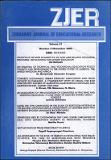| dc.contributor.author | Dozva, Martha | |
| dc.coverage.spatial | Zimbabwe. | en |
| dc.date.accessioned | 2015-07-13T09:14:52Z | |
| dc.date.available | 2015-07-13T09:14:52Z | |
| dc.date.issued | 2009-11 | |
| dc.identifier.citation | Dozva, M. (2009) Strategies Used by Chitungwiza Day Care Centre Caregivers to Deal with Separation Anxiety in Preschool Children, ZJER vol .21, no. 3. (pp. 358-374) , UZ, Mt. Pleasant, Harare: HRRC. | en |
| dc.identifier.issn | 1013-3445 | |
| dc.identifier.uri | https://opendocs.ids.ac.uk/opendocs/handle/20.500.12413/6557 | |
| dc.description | A ZJER study conducted to investigate strategies used by Chitungwiza day care centre caregivers to deal with separation anxiety in preschool children in Zimbabwe. | en |
| dc.description.abstract | This study was conducted to investigate strategies used by Chitungwiza day care centre caregivers to deal with separation anxiety in preschool children. It was important to have an insight into the strategies used because failure to reduce the distress in children with separation anxiety has a negative impact on the development of the whole child. Thirty- nine preschool caregivers selected from 21 preschools through stratified random sampling participated in the study. Strata of responsible authorities comprised proprietors, cooperatives, churches and one government sponsored institution. Similarly, preschool caregivers were randomly selected from strata of caregivers for 3-4 year olds, 4-5 year olds and 5-6 year olds. Data were collected mainly by means of a questionnaire and analysed using frequencies and percentages to show responses to the questions. Focus group discussions were also conducted to check and validate the responses in the individual questionnaires. Results revealed that most Chitungwiza day care centre caregivers use more limited strategies to deal with separation anxiety in children. It also emerged that the type of training in the caregivers’ professional background was positively related to the selection of varied methods to deal with separation anxiety. The more sustained the training received, the more varied the strategies used in handling separation were. The obvious recommendation from these findings was the need to improve the professional background of ECD caregivers through training in these strategies. Caregivers trained in non standardised programmes should be provided with more exposure to various strategies which help children cope with separation on a regular basis through workshops, literature and other activities. Such platforms can allow caregivers to share their experiences and ideas on how best they can effectively help children cope with separation. Inclusion of preparatory and gradual introduction to day care strategies in school policies have also been recommended for the findings. | en |
| dc.language.iso | en | en |
| dc.publisher | Human Resource Research Centre (HRRC) , University of Zimbabwe (UZ.) | en |
| dc.rights.uri | http://creativecommons.org/licenses/by-nc-nd/3.0/ | en |
| dc.subject | Children and Youth | en |
| dc.title | Strategies Used by Chitungwiza Day Care Centre Caregivers to Deal with Separation Anxiety in Preschool Children | en |
| dc.type | Article | en |
| dc.rights.holder | University of Zimbabwe (UZ) | en |


